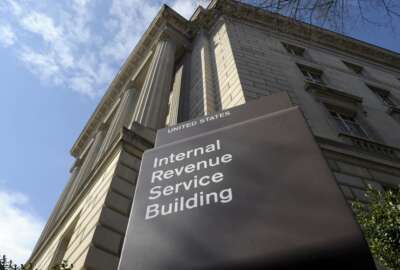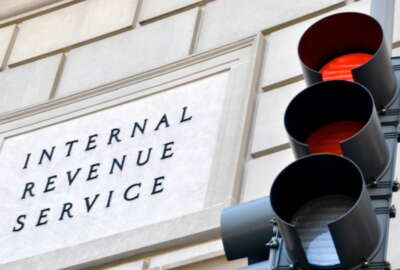
Amid fraud threats, IRS turns to private firms for help collecting late taxes
The Internal Revenue Service hopes to close the tax gap by using private collection agencies (PCAs) to outsource delinquent tax payments. Agency officials say i...
Beginning this month, the IRS is contracting with four firms to collect on overdue tax accounts, and after recent phone scams in which thousands of people were tricked into paying hundreds of millions of dollars, the IRS is taking no chances with its outreach to taxpayers.
“If you know you’re current on your taxes and you get a call from someone demanding you pay an overdue federal tax bill, that’s a sure sign of a scam,” said Mary Beth Murphy, commissioner for the IRS’ Small Business/Self-Employed Division, during an April 4 press call. “We urge everyone to be on the lookout for scammers who might use this program as a cover to swindle taxpayers. We will be watching closely for any such schemes as the private collection program gets underway.”
The accounts taken up by the private collection agencies (PCAs) are chosen through several criteria including age and lack of resources preventing the agency from following up on the tax debt, IRS said. The four firms contracted for the program are CBE Group of Cedar Falls, Iowa; Conserve of Fairport, New York.; Performant of Livermore, California; and Pioneer of Horseheads, New York.
The IRS reports that nearly $400 billion in taxes go unpaid every year.
“You can go to IRS.gov to check your account,” Murphy said. “Today we have the ability for every taxpayer to register and create an account. If the account balance says zero, that means nothing is due. So there should be no need for either the IRS or one of the private firms in the program to contact you about a tax debt.”
Murphy said taxpayer accounts will only be sent to one of the four firms, and the firms are only handling a “very small portion” of overdue tax accounts. Those accounts have already been contacted by the IRS multiple times under the agency’s normal collection process, Murphy said, “so they’re well aware they have an issue with back taxes.”
Murphy said the plan for the first four weeks is to send 100 cases per week to each of the companies. Depending on how well the firms handle the case load, that number will be increased to 1,000 cases per week to each individual firm.
Lessons learned
Bill Banowsky, lead for the IRS’ private debt collection program, said the first cases will be simpler ones, and will progress to higher dollar amounts owed.
The program has been tried twice before in the past two decades. A provision within a highway bill passed in 2015 set up the program for 2017.
The law requires a biannual report to Congress and an independent review of the program that will be shared with lawmakers, Banowsky said.
IRS is also working with the Taxpayer Advocate, employees unions and the Treasury Inspector General for Tax Administration.
“I think we’ve learned some things from the last iteration. One of those was to be very careful about ensuring the taxpayers have confidence that they’re talking to a private collection agency,” Banowsky said. “We’ve put some things in place to help promote that confidence for the taxpayer as they work to resolve their account. We also learned it’s important for us to share enough information with the private collection agency so they can work the case to completion.”
The IRS will send written notice to each taxpayer and their representative that their account is being transferred to a PCA. The PCA will send a second letter confirming the transfer.
“The next step will be a phone call from the private firm to the taxpayer,” Murphy said. “During that call, there are additional steps the firm must take to authenticate itself so the taxpayer can be certain the company they’re talking to is legitimately acting on behalf of the IRS. I don’t want to help the scammers by giving away any details, but we feel these steps will further safeguard taxpayer privacy and security.”
The firms are allowed to discuss payment options with the taxpayer and set up payment agreements, but payments are sent directly to the IRS or Treasury Department.
National Treasury Employees Union President Tony Reardon said in a statement that during the past programs, taxpayers were harassed by collections agents.
“Every time this has been tried before, it has failed,” Reardon said in an April 4 statement. “But once again Congress has forced this policy on the IRS, and we expect the results to be the same: collection agents getting paid to harass taxpayers, many of whom need assistance, not threats.”
Murphy said the firms’ employees are expected “to adhere to the same requirements as IRS employees,” and treat taxpayers and their rights with respect.
Ability to operate
According to President Donald Trump’s fiscal 2018 budget proposal, the Treasury Department would be cut by about $500 million. About $239 million would come from cuts to IRS.
“With respect to the budget and appropriated funds, the current budget will not impact our ability,” Banowsky said. “We do anticipate that as the program gets up and running, and we do have retained earnings, that will allow us to have funds available to pay for the cost of administering the program.”
According to the 2016 IRS Data Book, the agency assessed nearly “$12.5 billion in additional taxes for returns not filed timely and collected more than $2.3 billion with delinquent returns.”
Copyright © 2024 Federal News Network. All rights reserved. This website is not intended for users located within the European Economic Area.
Related Stories





